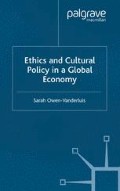Abstract
The argument of the past few chapters has claimed, first, that economic efficiency cannot be considered of value in itself. This led us to argue that theories of welfare economics cannot provide a satisfactory account of the good life; they must be located within other moral theories. Second, the book sought to assess the moral claims of community-based approaches to cultural policy. So far, we have found market-based and some (national survival) community-based approaches to be inadequate and distorting.
Access this chapter
Tax calculation will be finalised at checkout
Purchases are for personal use only
Preview
Unable to display preview. Download preview PDF.
Notes
Charles Taylor, ‘Introduction’, in Taylor, Human Agency and Language: Philosophical Papers, Vol. 1 (Cambridge: Cambridge University Press, 1985), p. 1.
Ibid.
Ibid., p. 34. On this point, see also Charles Taylor, Sources of the Self the Making of the Modern Identity (Cambridge, Mass.: Harvard University Press, 1989), Part I.
Charles Taylor, ‘Irreducibly Social Goods’, in Taylor, Philosophical Arguments (Cambridge, Mass.: Harvard University Press, 1995), p. 136.
Charles Taylor, ‘Understanding and Ethnocentricity’, in Taylor, Philosophy and the Human Sciences: Philosophical Papers 2 (Cambridge: Cambridge University Press, 1985), pp. 123–4.
Taylor, ‘The Politics of Recognition’, p. 225, emphasis in original. See also Charles Taylor, ‘Why Do Nations Have to Become States?’, in Charles Taylor, Reconciling the Solitudes: Essays on Canadian Federalism and Nationalism, ed. Guy Laforest (Montreal and Kingston: McGill-Queen’s University Press, 1993), especially pp. 52–3.
Charles Taylor, Hegel and Modern Society (Cambridge: Cambridge University Press, 1979), p. 160, emphasis in original.
Ibid., p. 169.
Amelie Oksenberg Rorty, ‘The Hidden Politics of Cultural Identification’, Political Theory, Vol. 22, No. 1 (1994), pp. 152–66.
See, for example, William Connolly, ‘Pluralism, Multiculturalism and the Nation-State: Rethinking the Connections’, Journal of Political Ideologies, Vol. 1, No. 1 (1996), pp. 53–74.
See, for example, Will Kymlicka, Multicultural Citizenship: a Liberal Theory of Minority Rights (Oxford: Clarendon, 1995), p. 91. See also Michael Sandel, Liberalism and the Limits of Justice (Cambridge: Cambridge University Press, 1982).
See, among others, Harvey Mitchell, ‘Review Article: Charles Taylor on the Self, Its Languages and Its History’, History of Political Thought, Vol. 12, No. 2 (1991), p. 357; Quentin Skinner, ‘Who Are “We”? Ambiguities of the Modern Self’, Inquiry, Vol. 34, No. 2 (1991), pp. 133–53; Connolly, ‘Pluralism, Multiculturalism and the Nation-State’, p. 63; and Judith Shklar, Review of Sources of the Self, by Charles Taylor, in Political Theory, Vol. 19, No. 1 (1991), pp. 105–9.
Michael L. Morgan, ‘Religion, History and Moral Discourse’, in James Tully (ed.), Philosophy in an Age of Pluralism: the Philosophy of Charles Taylor in Question (Cambridge: Cambridge University Press, 1994), p. 51.
Ronald Beiner, ‘Hermeneutical Generosity and Social Criticism’, Critical Review, Vol. 9, No. 4 (1995), p. 455.
Ibid., p. 454.
Copyright information
© 2003 Sarah Owen-Vandersluis
About this chapter
Cite this chapter
Owen-Vandersluis, S. (2003). Towards an Ethics for Cultural Policy: Charles Taylor Considered. In: Ethics and Cultural Policy in a Global Economy. Palgrave Macmillan, London. https://doi.org/10.1057/9781403943781_5
Download citation
DOI: https://doi.org/10.1057/9781403943781_5
Publisher Name: Palgrave Macmillan, London
Print ISBN: 978-1-349-43033-8
Online ISBN: 978-1-4039-4378-1
eBook Packages: Palgrave Political & Intern. Studies CollectionPolitical Science and International Studies (R0)

